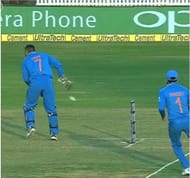Retirement is the ugliest word in the language - Ernest Hemingway
Retirement is indeed an ugly word. It signifies an end and more often than not makes people emotional. In the world of sport, the word becomes uglier and pours out incomparable emotions.
The thing that really makes it ugly in sports is when people start commenting on when a player should retire. And the root cause is that in the sporting world, there is no predefined age for retirement. In India, central government employees retire at the age of 60 and similarly other countries also have a predefined age for retirement, but there is no such rule in sports, world over.
Also read: Humour: MS Dhoni's post-retirement CV
An international sportsperson can go on to play as long as he is good enough to be selected in his respective sport. But this absence of a retirement rule does not stop the critics and media from declaring the R-day for a sportsperson.
And this phenomenon of publicly voicing one’s opinion on retirement increases with the greatness of a player. No one is bothered to know when a mediocre player should hang up his boots. But when you are the number one player in your game or if you are the greatest sportsperson of your country then it draws the attention of everyone right from a roadside tea vendor to the sporting greats of yesteryears.
Past greats have also been victims of this conundrum
Recall the retirements of great players in the past decade and you will realise that no one has been spared from this ugly phenomenon. In tennis, be it Pete Sampras or Andre Agassi; everyone has had to go through this public dissection of their retirement dates.
More recently, there has been a question mark on whether Roger Federer should continue to play. Closer to home, even Sachin Tendulkar who has a god-like status in India had to face headlines such as “End-ulkar.”
Why retire when you are still the number one in your department?
So, the recent hue & cry over Mahendra Singh Dhoni’s retirement should not come as a surprise. I am not a person who is in favour of keeping players just on the basis of their past records. But if you are still the number one wicket-keeper batsman in the country, then the call for you to retire does not make any sense to me.
In my opinion, if a player on the merit of his form is one of the top eleven cricketers currently playing the game in the country then he deserves to be in the team and his age then becomes just a number.
A look at Dhoni’s stats over the past three years just highlights my point. Dhoni’s batting average in ODIs over the past three years (2014-2016) is 41.75 which is way lower than his career average of 50.89.
As a wicket-keeper, his performance has, in fact, improved if we strictly go by the stats. Over the past three years, he has been involved in 68 dismissals in 50 innings and has a dismissal/innings ratio of 1.36 which is higher when compared to his career dismissal/innings ratio of 1.286.
Now the question we need to ask is whether an average of 40+ at a strike rate of more than 85 is bad enough to consider retirement. But the problem that players of Dhoni’s calibre face is that they are not compared to other players but are compared to a younger version of themselves.
With due respect to India’s Test wicket-keeper Wriddhiman Saha, the fact is that currently, Dhoni is still a better wicket-keeper batsman than him and still commands the position as the number one wicket-keeper batsman in the country.
‘Dhoni of 2016’ is not as good as ‘Dhoni of 2011’
But for the armchair critic and the fanatic cricket fans, Dhoni needs to retire since ‘Dhoni of 2016’ is probably not as good as ‘Dhoni of 2011’. And the matter worsens when even the selection committee starts thinking on these lines. We have seen in the past how great players have been sacrificed and the chairman of the selection committee has come up with a standard one-liner like - “With the aim of looking at the future, we have infused young talent in the team.”
Also read: Indian selectors back Mahendra Singh Dhoni to continue playing till 2019 World Cup
One thing we need to realise is that players are not like wine and often do not get better with age. There is an aspect of agility involved with sports and one’s reflexes are bound to get slower with age. Also, a batsman who is 35 years old may not be as fearless compared to when he was 20 years old.
Calls for change might get louder if India performs well this season
I am pretty certain that if India performs well in the long home season this year under Virat Kohli’s captaincy then there will be a crescendo in the demand for Dhoni to part ways with ODI captaincy as well. I do not doubt Kohli’s potential as a skipper, but if the Indian ODI team is doing well under Dhoni then I am unable to understand the rationale behind replacing him.
It is a different matter altogether if Dhoni himself decides that he has had enough and the baton of captaincy should be passed on to Kohli. But for lesser mortals like us to pass a judgment on the country’s most successful captain is a heinous offence.
So, I will just hope that until the time Dhoni, in scholar Scott Elledge’s style, says, “It is time I stepped aside for a less experienced and less able man,” he is allowed to continue to lead the Indian team.
What are Andre Agassi-Steffi Graf’s children doing now? Everything to know about Jaz & Jaden Agassi

